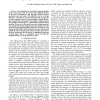Free Online Productivity Tools
i2Speak
i2Symbol
i2OCR
iTex2Img
iWeb2Print
iWeb2Shot
i2Type
iPdf2Split
iPdf2Merge
i2Bopomofo
i2Arabic
i2Style
i2Image
i2PDF
iLatex2Rtf
Sci2ools
CDC
2010
IEEE
2010
IEEE
A simple optimal power flow model with energy storage
The integration of renewable energy generation, such as wind power, into the electric grid is difficult because of the source intermittency and the large distance between generation sites and users. This difficulty can be overcome through a transmission network with large-scale storage that not only transports power, but also mitigates against fluctuations in generation and supply. We formulate an optimal power flow problem with storage as a finite-horizon optimal control problem. We prove, for the special case with a single generator and a single load, that the optimal generation schedule will cross the time-varying demand profile at most once, from above. This means that the optimal policy will generate more than demand initially in order to charge up the battery, and then generate less than the demand and use the battery to supplement generation in final stages. This is a consequence of the fact that the marginal storage cost-to-go decreases in time.
CDC 2010 | Control Systems | Finite-horizon Optimal Control | Generation | Optimal Generation Schedule |
| Added | 13 May 2011 |
| Updated | 13 May 2011 |
| Type | Journal |
| Year | 2010 |
| Where | CDC |
| Authors | K. Mani Chandy, Steven H. Low, Ufuk Topcu, Huan Xu |
Comments (0)

